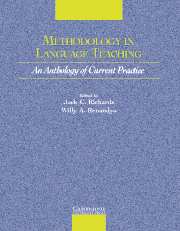Book contents
- Frontmatter
- Contents
- Acknowledgments
- Introduction
- Section I Approaches to Teaching
- Section 2 Lesson Planning and Classroom Management
- Section 3 Classroom Dynamics
- Section 4 Syllabus Design and Instructional Materials
- Section 5 Task and Project Work
- Section 6 Learning Strategies
- Section 7 Teaching Grammar
- Section 8 Teaching Pronunciation
- Section 9 Teaching Speaking
- Section 10 Teaching Listening
- Section 11 Teaching Vocabulary
- Section 12 Teaching Reading
- Section 13 Teaching Writing
- Section 14 Assessment
- Section 15 Technologies in the Classroom
- Section 16 Professional Development
- Credits
- Author Index
- Subject Index
Section I - Approaches to Teaching
Published online by Cambridge University Press: 10 November 2010
- Frontmatter
- Contents
- Acknowledgments
- Introduction
- Section I Approaches to Teaching
- Section 2 Lesson Planning and Classroom Management
- Section 3 Classroom Dynamics
- Section 4 Syllabus Design and Instructional Materials
- Section 5 Task and Project Work
- Section 6 Learning Strategies
- Section 7 Teaching Grammar
- Section 8 Teaching Pronunciation
- Section 9 Teaching Speaking
- Section 10 Teaching Listening
- Section 11 Teaching Vocabulary
- Section 12 Teaching Reading
- Section 13 Teaching Writing
- Section 14 Assessment
- Section 15 Technologies in the Classroom
- Section 16 Professional Development
- Credits
- Author Index
- Subject Index
Summary
INTRODUCTION
The two papers in this section reexamine the notion of methods of teaching and offer complementary perspectives on how the nature of teaching can be understood. Although for much of the twentieth century a primary concern of the language teaching profession was to find more effective methods of language teaching, by the twenty-first century there has been a movement away from a preoccupation with generic teaching methods toward a more complex view of language teaching which encompasses a multifaceted understanding of the teaching and learning processes. Brown traces this movement from a preoccupation with “methods” to a focus on “pedagogy.”
The notion of teaching methods has had a long history in language teaching, as is witnessed by the rise and fall of a variety of methods throughout the recent history of language teaching. Some, such as Audiolingualism, became the orthodox teaching methods of the 1970s in many parts of the world. Other guru-led methods such as the Silent Way attracted small but devoted followers in the 1980s and beyond, but attract little attention today. Many teachers have found the notion of methods attractive over the last one hundred or so years, since they offer apparently foolproof systems for classroom instruction and are hence sometimes embraced enthusiastically as a panacea for the “language teaching problem.” The 1970s and 1980s were perhaps the years of greatest enthusiasm for methods.
Information
- Type
- Chapter
- Information
- Methodology in Language TeachingAn Anthology of Current Practice, pp. 5 - 8Publisher: Cambridge University PressPrint publication year: 2002
Accessibility standard: Unknown
Why this information is here
This section outlines the accessibility features of this content - including support for screen readers, full keyboard navigation and high-contrast display options. This may not be relevant for you.Accessibility Information
- 2
- Cited by
